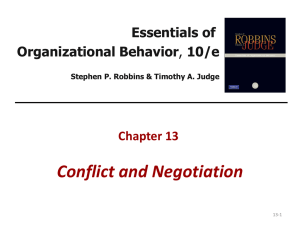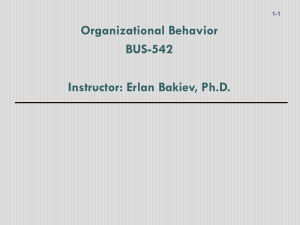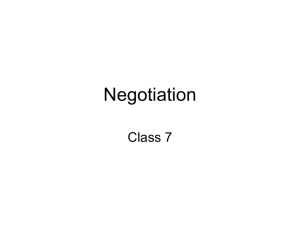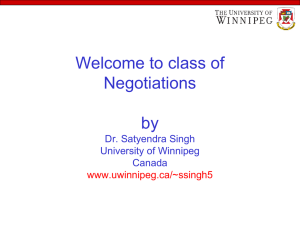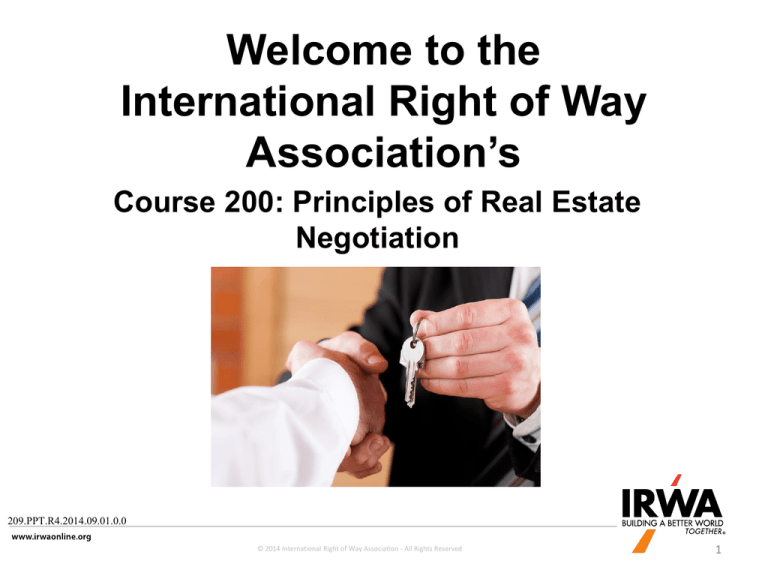
Welcome to the
International Right of Way
Association’s
Course 200: Principles of Real Estate
Negotiation
209.PPT.R4.2014.09.01.0.0
© 2014 International Right of Way Association - All Rights Reserved
1
Introductions
Who we are…
What we do…
Where we do it…
How long we’ve been doing it…
Our goals for the course...
2
Objectives
At the conclusion of the course, you will be able to...
Identify, understand, and apply the principles associated with effective
attitudinal, integrative, bargaining, and intra-agency negotiation.
Articulate the conditions necessary for negotiations
to proceed and the primary roles of the agent.
Discuss the characteristics of successful negotiators.
Exhibit the communication skills of successful negotiators.
Explain and implement a plan for effective negotiations.
Identify and analyze variables that may influence the negotiation process.
Identify alternative strategies to pursue when negotiations fail.
© 2014 International Right of Way Association - All Rights Reserved
3
Housekeeping
© 2014 International Right of Way Association - All Rights Reserved
4
Schedule
The schedule will proceed as follows:
Day One
8:00 - 8:30
Introductions, etc.
8:30 - 9:00
Overview
9:00 - 10:00 Negotiation Principles
10:15 - 11:45 Characteristics of the Successful Negotiator
12:45 - 2:15 Communication Skills
2:30 - 4:45
Attitudinal and Integrative Negotiations
8:00 - 8:30
8:30 - 10:00
10:15 - 11:45
12:45 - 1:15
1:15 - 2:15
2:30 - 3:30
4:00 - 5:00
Day Two
Recap Day One
Bargaining and Intra-agency Negotiations
A Plan
Variables that May Influence Negotiations
When Negotiations Fail
Summary and Review
Exam
5
Negotiation
… the process by
which two
or more people
resolve differences
to reach a mutually
acceptable
agreement.
© 2014 International Right of Way Association - All Rights Reserved
6
Types of Negotiation
Integrative
Bargaining
Attitudinal
Intra-agency
© 2014 International Right of Way Association - All Rights Reserved
7
Integrative
“Win-Win”
Mutually beneficial outcomes
Inquiry
Collaborative
© 2014 International Right of Way Association - All Rights Reserved
8
The Pie
© 2014 International Right of Way Association - All Rights Reserved
9
Bargaining
“Win-Lose”
“Zero-Sum”
Advocates positions
Compromise
© 2014 International Right of Way Association - All Rights Reserved
10
Attitudinal
Shared
frame of
reference
Trust
Common
ground
11
Intra-agency
Intra-organization
© 2014 International Right of Way Association - All Rights Reserved
12
Conditions Necessary...
Issues must
be
negotiable
Parties must
be willing to
negotiate
Parties must
trust each
other
13
Trust
Placing confidence in another, based on that person’s
character, ability, strength, or truthfulness
© 2014 International Right of Way Association - All Rights Reserved
14
Characteristics(1)
Credibility
Courage
Empathy
Integrity/Ethics
Patience
15
Power
Legitimate
Reward
Coercive
Reverent
Charismatic
Expertise
Situation
Information
16
Characteristics(2)
Credibility
Courage
Empathy
Integrity/Ethics
Patience
17
Questions
• “Would you like a drink?”
• “My spouse doesn’t need to meet
with us. Let’s just get started. OK?”
• “What happens if I don’t sign?”
18
Message
Send
Encoded
Transmitted
Interference
Communication Model
Received
Decoded
19
Communication Skills (1)
Listening
Relationship building
Asking good questions
Maintaining relationships
Feedback
Managing impressions
Motivation
20
Questions
Primary
Channel probes
Irrelevant
answer probes
Closed-ended
Clarity probes
Reactive probes
Open-ended
Completion
probes
Non-response
probes
21
Maintaining Relationships
Shared control
Openness
Interdependence
Equality
“Liking”
Self-worth
Similarities
Trust
No jargon
22
Communication Skills (2)
Listening
Relationship building
Asking good questions
Maintaining relationships
Feedback
23
Maslow
24
Attitudinal
Shared
frame of
reference
Trust
Common
ground
25
Attitudinal Tips
Inquiry
rather than
advocacy
Communicate
Stage setting
26
Listening Strategies
Focus
Track
Reflect
Clarity
Diplomacy
Redirect
27
Integrative
“Win-Win”
Mutually beneficial outcomes
Inquiry
Collaborative
28
Integrative
I. Information Getting
II. Information Giving
III. Problem Census
IV. Problem Solving
V. Closing
29
Day One Recap
Today, we…
Articulated some of the conditions necessary for
negotiations to proceed and the primary roles of
the agent.
Discussed the characteristics of successful
negotiators.
Looked at communication skills of successful
negotiators.
Examined attitudinal and integrative negotiation,
including the Funnel Technique.
30
Day Two
Today, we will...
Examine bargaining and intra-agency negotiation.
Look at a negotiation plan.
Analyze variables that influence the negotiation
process.
Identify alternate strategies when negotiations fail.
31
Bargaining
“Win-Lose”
“Zero-Sum”
Advocates positions
Compromise
© 2014 International Right of Way Association - All Rights Reserved
32
Bargaining Tips
Separate people from problems
Question tactics not character
Avoid diversions
Focus on interests
Mutual gain
Brainstorm
Objective criteria (Facts)
Set standards
Broaden range
© 2014 International Right of Way Association - All Rights Reserved
33
Intra-agency
© 2014 International Right of Way Association - All Rights Reserved
34
A Plan (1)
Analyze the project’s impacts
Develop an understanding of the owner
Optimize strengths and opportunities and minimize
weaknesses and threats
Incorporate listening and conflict management skills
Remember the “rules”
BATNA
© 2014 International Right of Way Association - All Rights Reserved
35
A Plan (2)
Analyze the project’s impacts
Develop an understanding of the owner
Optimize strengths and opportunities and minimize
weaknesses and threats
Incorporate listening and conflict management skills
Remember the “rules”
BATNA
© 2014 International Right of Way Association - All Rights Reserved
36
A Plan (3)
Analyze the project’s impacts
Develop an understanding of the owner
Optimize strengths and opportunities and minimize
weaknesses and threats
Incorporate listening and conflict management skills
Remember the “rules”
BATNA
© 2014 International Right of Way Association - All Rights Reserved
37
Listening
People oriented listeners
Action oriented listeners
Content oriented listeners
Time oriented listeners
© 2014 International Right of Way Association - All Rights Reserved
38
Conflict Management Styles
Avoidance
Accommodation
Competition
Compromise
Integration
© 2014 International Right of Way Association - All Rights Reserved
39
A Plan (4)
Analyze the project’s impacts
Develop an understanding of the owner
Optimize strengths and opportunities and minimize
weaknesses and threats
Incorporate listening and conflict management skills
Remember the “rules”
BATNA
© 2014 International Right of Way Association - All Rights Reserved
40
A Plan (5)
Analyze the project’s impacts
Develop an understanding of the owner
Optimize strengths and opportunities and minimize
weaknesses and threats
Incorporate listening and conflict management skills
Remember the “rules”
BATNA
© 2014 International Right of Way Association - All Rights Reserved
41
A Plan (6)
Analyze the project’s impacts
Develop an understanding of the owner
Optimize strengths and opportunities and minimize
weaknesses and threats
Incorporate listening and conflict management skills
Remember the “rules”
BATNA
© 2014 International Right of Way Association - All Rights Reserved
42
A Plan (7)
Analyze the project’s impacts
Develop an understanding of the owner
Optimize strengths and opportunities and minimize
weaknesses and threats
Incorporate listening and conflict management skills
Remember the “rules”
BATNA
© 2014 International Right of Way Association - All Rights Reserved
43
Problem Solving or Bargaining?
Acquisition type (fee, fee without access, permanent
easement, temporary easement)
Property owner’s “style”
Project funding source
The magnitude of the offer
The project schedule
Other variables
© 2014 International Right of Way Association - All Rights Reserved
44
BATNAs
Condemnation preparation
Mediation
Advisory arbitration
Fact finding
Med-Arb
Binding arbitration
© 2014 International Right of Way Association - All Rights Reserved
45
Objectives
Now you should be able to...
Identify, understand, and apply the principles associated with effective
attitudinal, integrative, bargaining, and intra-agency negotiation.
Articulate the conditions necessary for negotiations to proceed and the
primary roles of the agent.
Discuss the characteristics of successful negotiators.
Exhibit the communication skills of successful negotiators.
Explain and implement a plan for effective negotiations.
Identify and analyze variables that may influence the negotiation
process.
Identify alternative strategies to pursue when negotiations fail.
46
Thank you!
209.PPT.R4.2014.09.01.0.0
47

